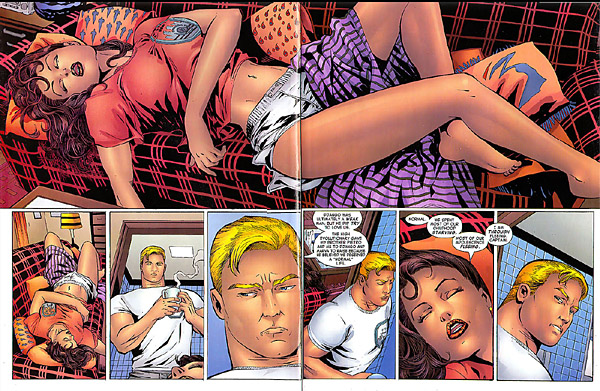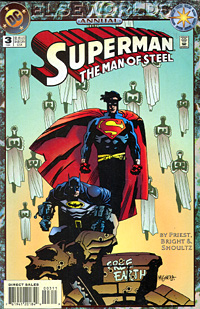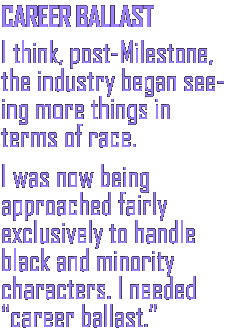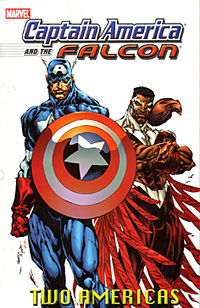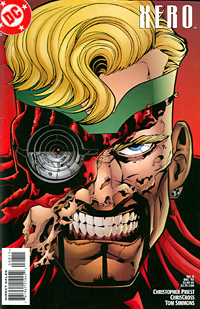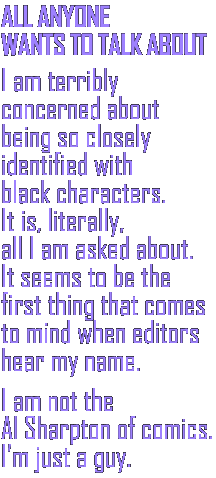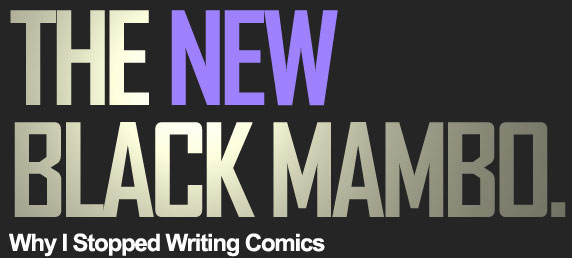
"Why don't you write comics anymore?"
I get asked this a lot, so much so that it made sense to me to
post something about it.
At some point I was no longer a writer.
I had, somehow, become a black writer. This perplexed me,
considering that, back in the halcyon 80’s, where Marvel was a hotbed of
scathing, litigiously un-PC sexism and racism (reference:
Rescue Me's potty-mouthed fire house), I was never seen
as a “black” writer. I competed with everybody else, with guys
who had much more experience than I, and did the grunt work and
odd jobs just like anybody else. Nobody at DC hired me to reboot
Green Lantern in Emerald Dawn because I was a black guy,
and Fabian Nicieza seemed to not notice or care about my skin
color when he approached me to dream up a Power Man/Iron
Fist-esque buddy book for his startup imprint Acclaim.
Pre-Milestone, the subject just didn't come up.
Which isn't to suggest racism did not exist, it surely did, but
that, for the most part, my race had nothing to do with the
assignments given me (or not as the case may be). Somewhere along the way, Marvel became much more PC and I became
inexplicably much blacker.
I was approached by DC to take over
Steel, after Dwayne McDuffie turned the assignment down,
because, as I was told, the editor wanted a fresh take on the
series and, by inference, a perhaps more authentic urban (née
black) voice. I wasn’t all that concerned that Louise Simonson’s
Steel was in any way inauthentic, and my Steel wasn’t any
“blacker” than hers. John Henry Irons was an egghead. It would
be wrong for him to suddenly start talking like Sam “Snap”
Wilson or Luke Cage. The whole race thing didn’t interest me
nearly as much as the idea of doing a kind of Life of Brian take
on Superman, creating a wicked satire of the superhero genre.
Steel was a dysfunctional Superman living in a dysfunctional
Metropolis (Jersey City), facing a warped, dysfunctional Lex
Luthor (Irons’ boss, Dr. Villain—“it’s WILL-hayne. It’s
French.”), courting a dysfunctional Lois Lane (Dr. Amanda Quick,
Irons’ love interest), and dealing with a dysfunctional Jimmy
Olsen (Irons’ niece, Natasha).
 Denys decided, without my input, to
Denys decided, without my input, to
base his interpretation of
Irons on Dwayne McDuffie. Once I saw the images, I instantly
knew who Irons was. He was Dwayne. Perhaps a little stiffer than
Dwayne, but hand to God I was writing Dwayne McDuffie and Denys
was drawing him. Steel was a book virtually everyone at DC
ignored, not because he was black but because he wasn’t selling.
Denys and I got away with unfathomable things in that book
which, month after month, took sharp aim not only at the
superhero genre but, frankly, at the fans themselves. Almost
nobody noticed—not the company, not the fans. It was Steel. Who
cares.
But I do think, post-Milestone, the industry began seeing more
things in terms of race. Between Steel and Black Panther, I
somehow transitioned from being a writer to being a black
writer. Steel was, I believe, the first time a company had
approached me for the specific stated purpose of hiring a
“black" writer. I failed miserably at that task. My Steel was
certainly no blacker than Louise’s, but the perception was such
because of my ethnicity.
Post-Panther, Tom Brevoort and I developed a terrific urban
mutli-ethnic book called The Crew. The book was slammed by fans
before a single page had been seen. It was slammed for its
premise, “The Black Avengers,” with terribly racist posts going
up about how “ghettoed out” some fans were, and how this was
somehow Marvel’s attempt at Milestone. Making matters worse, The
Crew was launched amid a huge promotion for a group launch of
books which failed miserably. The Crew was cancelled before the
first issue went on sale, which was incredibly demoralizing
considering how hard it was in those days simply to get a
project approved: months of very hard work and a terrific book
that wasn’t given any chance at all.
Captain America & The Falcon followed that, with fan favorite
artist Bart Sears on board, which felt like a return to
mainstream for me. I was back to being a writer, as opposed to a
black writer. I looked for a new dynamic between these old
friends and found one in echoing Paul McCartney and John
Lennon’s balance of optimism and cynicism, It’s getting
better all the time… It couldn’t get no worse. The
conniving, streetwise Falcon routinely (and surreptitiously)
running off the reservation, cutting
ethical corners the straight-arrow Cap never would. Only, Sears
torpedoed the optically complex opening arc by drawing beautiful pictures that had
little to do with the story, making the book a confusing and difficult read.
Joe Bennett came to the rescue with issue #5, but the fans left
with Sears and CAF was dragged under in the wake of Captain
America’s transition from Marvel Knights back to mainstream
Marvel. The decision was made to remove Captain America from the
book and continue with my unique take on The Falcon, a logical
(and I believe completely colorblind) move as the Falcon
character was where most of the series’ voltage was. But it felt
like a demotion, sent back to triple-A. Priest can’t cut it with
mainstream characters.
Love & Ethics:: Captain America struggles with both in CAF #7. I loved putting Cap into moral and ethical dilemmas. He has nown the Scarlet Witch since she was a teenager, and, technically, Cap is around 70 years old. This would have been a lot of fun to run out the conflicts on, but with the looming Avengers reboot I was asked to make this go away. Click to read entire scene.
Career Ballast
I agreed to do Falcon if I could concurrently work on a more
“mainstream” book, something with white characters. I told Tom I
needed “career ballast,” that I was now being approached fairly
exclusively to handle black and minority characters. Tom had no
issues with that and was interested in whatever ideas I had. I
pitched a miniseries featuring an all-female cast, a kind of
Female Avengers pilot, which Tom liked. The project was handed
off to another editor and, as things happen, the creative
direction just never clicked. It was rewrite after rewrite after
plot conference after plot conference, and the inertia wore me
out. The Crew debacle was also rattling in my head: months of
development work and Marvel folds the book in with some
unrelated promotion which fails, canceling nearly the entire
line of new launches, including The Crew. I never got the last
project through development. The hill was too steep, the rock
too heavy and, frankly, I thought the development process was
counterintuitive. Beating a writer’s brains out for six months
over a four-issue mini just feels passive aggressive. Just say,
“No, we don’t want this.” Don’t just keep grinding away. Without
the “career ballast,” I did not make myself available for
Falcon, and although Marvel was willing to go a few more rounds
with CAF, I asked Tom to pull the plug with #14, and went off to
write a trio of Green Lantern novels for DC.
I won’t write pitches for comics anymore. Hire me, don’t hire
me, but I won’t go through that ridiculous process anymore. What
publishers should do is hire the guy, the way movies hire a guy,
and pay him while he’s in the development process. Don’t lead
him around by his nose, don’t steal his ideas and run with
somebody else—both of which have happened to me. If you believe
in a creative talent, invest in him. We Want You. We Want You To
Come Up With An Idea And We’ll Pay Your Rent While You Do It.
I’ve been out of the loop so long, I don’t know if that actually
happens, but it should.
In the intervening years, I’ve been approached many times about
many things. Virtually all of those things were attached to a
minority character, most hilariously including Firestorm, whom
DC approached me about and I actually said I’d give it a try
before discovering Firestorm was now black. *sigh*
There are two instant “yes”-es in my vocabulary: Batman and Iron
Man. Yes. Without question. That’s the smallest piece of fanboy
remaining in me. But that’s had 30 years to happen and it hasn’t
thus far. Beyond that, I’ve said, repeatedly, that if a
publisher wants to get real and offer me a gig—not an
opportunity to run in circles and then jam me—I’d look at it.
Flash, Green Lantern, Thor, Deadpool. But if my name only comes
to mind when looking for a writer to helm The New Black Mambo,
thanks but no thanks. It really won’t bother me to never write
comics again. That’s not a choice I’ve made, but I have made a
choice to be a writer, not a black writer. I am more than busy
doing work that actually matters—feeding the hungry, comforting
the lowly, preaching the Good News. Doesn’t pay nearly as well,
but the gig comes with amazing fringe benefits.
Christopher J. Priest
19 September 2011
Home | Blog | Projects | Comics | Rants | Music | Video | Christian Site | Contact
Clip From Rescue Me Copyright © 2011 Sony Pictures Television.
Images Copyright © 2011 DC Comics and Marvel Entertainment.
Text Copyright © 2011 Lamercie Park. All Rights Reserved.
TOP OF PAGE

